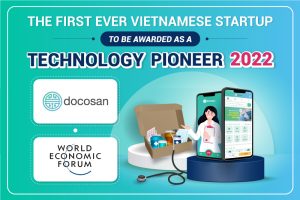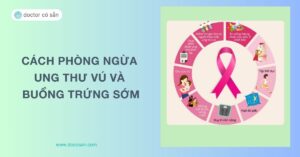A Podcast by Michael Tatarski featuring Docosan’s Co-founder and CEO Beth Ann Lopez.
The actual recorded podcast can be accessed here: https://vietnamweekly.substack.com/p/changing-the-doctorpatient-relationship
Michael: This is Michael Tatarski, with a new episode of the Vietnam Weekly podcast, and I am joined today by my friend Beth Lopez, the cofounder and CEO of Docosan. So Beth, I’ll let you introduce yourself and Docosan a bit more.
Beth: Hi Mike, thanks so much for having me. So Docosan is a health tech startup based here in Ho Chi Minh City. The name Docosan is a mixture of English and Vietnamese words, Doc as in doctor and co san as in available in Vietnamese. That reflects our mission to transform the way that Vietnam’s middle class accesses healthcare for the better. By a digital marketplace that patients can easily compare doctors based on quality, location, and price. And it massively expands doctors’ client bases beyond word-of-mouth circles.
Michael: Yeah, and it’s both a website and an app right?
Beth: Right, so there’s an app for doctors, an app for patients and it’s all fully web optimized too.
Michael: Gotcha. And I’ve used it a few times. We’ll get into that a little more but how did you get into public health or working in health?
Beth: Well, I think I’ve always been interested in healthcare. My undergrad was in biochemistry and I wanted to go into medicine actually. So after I graduated, I joined the peace corps cause I wanted to get more practical experience, and they sent me to Cambodia. So back in those days, you couldn’t choose the country that you went to and I didn’t really know anything about Asia or Cambodia. I knew it was on a map but nothing else beyond that. So I worked as a community health worker in rural areas of Cambodia for about 3 years. And I absolutely fell in love with Cambodia and the ASEAN region as a whole. And that really changed my perspectives on healthcare. So poor access to healthcare was not caused just by a lack of doctors, but there’s so many factors that go into it. For example, where I lived, there wasn’t clean running water. A lot of the little kids had a lot of gastrointestinal issues. A lot of people from the neighboring villages had to travel pretty far on dangerous roads. There just wasn’t road safety, people weren’t wearing seatbelts, so road accidents were a big thing. So I saw that it really was public health that determined whether someone had good healthcare. So after I finished working in Cambodia, I decided to pursue public health instead of medicine and got my masters in public health at Harvard, and then came right back to Southeast Asia after that. I’ve been here ever since.
Michael: When did you move to Vietnam again?
Beth: To Vietnam it’s been about a little over 3 years.
Michael: So what led to the decision to start Docosan?
Beth: Well I couldn’t find a doctor for myself – that’s the first thing. So I just needed to get an IUD removed, I googled and found a hospital with the biggest marketing budget. I went to the hospital, did all the checking, and then I was told to come back after COVID. So as we know now, there is no after COVID, and I would still be waiting. And so it’s just so difficult to navigate healthcare here. And I previously worked for a Singaporean pharma tech startup as a market launcher, and that’s what brought me to Vietnam, but that’s 3 years ago or so. They launched their app for pharmacists here and within a year, it grew to where 1 in 3 pharmacists in the country were using the app. So I saw this huge opportunity. It’s hard to find the right doctor, let alone know about the quality and price in advance. Vietnamese people are so digitally savvy, they’re doing everything on their smartphones, like taxis, food, paying bills, trading stocks.. But the healthcare system is largely offline and fragmented, so it just made perfect sense.
Michael: What was it like starting it? Obviously there’s 2 sides of it, the doctors and the patients side. How did you get off the ground? How did you get buy-in from doctors initially?
Beth: Right, there’s a lot of advantages and disadvantages of starting here. Some of the main advantages are that there’s great tech talent. It’s really easy to find engineers and they are quite skilled, and there’s a digitally savvy population. There’s also tens of thousands of private clinics and hospitals who are competing for patients. So it’s quite competitive. There’s like 50,000 clinics in the country. Those are some of the advantages. As for the disadvantages, people are still not used to the idea of booking appointments, and doing healthcare digitally, so it’s a new concept. Even those old school appointments are not really a thing for most people. But that’s what makes it a gamechanger, people can change their behavior and mask the same way as when grabbing transportation. So it’s hard to imagine haggling with prices, struggling with the directions. So in the future, it’ll be just as intuitive with healthcare.
Michael: Okay, and I guess at this point maybe for listeners not in Vietnam or less familiar with the healthcare system here, how does it work basically? You’re mentioning doctors and private clinics or public, how does it kind of work in a general sense?
Beth: Yes, so there is a big public sector as well, there’s fantastic quality of doctors both in the public and private sector. The public sector can sometimes be a little overwhelmed due to the sheer volume of patients, so it’s not uncommon to see big crowds of people waiting in line to get to see a doctor there. At the same time, in the private sector, you often have the same doctors who practice in the public sector, but the clinic might be empty during some hours even with very senior doctors, so it’s just all about discovering the right place to find the right doctor, because there is no information on it. You don’t know about the quality of the clinic across the street, sometimes you just don’t have the right information if they offer the service that you need or if the doctor speaks your language.
Michael: Yeah, definitely. Even to notable places, like I went to City International Hospital which is pretty far from my house, for a procedure that went really well and I would have never even thought to look there if not for Docosan. And it was much more affordable than I’ve been quoted elsewhere.
Beth: Yeah, that’s the thing. There are fantastic providers all across the cities, so one doctor in particular, he’s a pulmonologist, and he did his full degree at Harvard. You know, he’s got these world class qualifications, and he’s also a professor at the University of Medicine and Pharmacy. He’s got a private clinic, but you wouldn’t know about his private clinic unless you had seen him before or you’ve heard from one of his other patients. They don’t spend a lot on digital marketing or advertising, and so you can go and get a consultation with a world class pulmonologist for about 250,000 Vietnam Dong, which is about 10 US dollars.
Michael: Wow, yeah. Certainly for foreigners that’s obviously a huge help. Because like you said, if you google, it’s kind of the same place that’ll always come up and the care I am sure is good but the prices are high even if you have insurance. So how did your team initially approach doctors and patients? Like you said, people were a lot more familiar with bookings and healthcare online perhaps. So how is that initial approach?
Beth: So ours is a digital marketplace and there’s 2 sides to that marketplace. And building marketplaces is sometimes difficult, because the doctors don’t want to join unless we already have a lot of patients. And of course the patients aren’t going to join unless we have the doctors that they need. So when we got started, we initially worked quite closely with some doctors from the University of Medicine and Pharmacy. So one of our advisors, professor An, works in family medicine over there and he guided us. We got a lot of our initial users who also happen to be very senior and qualified doctors just through this initial testing phase because they are academics, and they are curious about this intervention that we are doing and I have just known them from my work before. Then after we had quite a few senior doctors on our network that joined early on, and other doctors saw that. The medical community is pretty small in Vietnam, we all kind of know each other more or less. And they see some senior doctors on the network, and think “oh hmm, I would like to join this too”. So kind of starting at this centre of excellence, with these professors from the University of Medicine, we were able to expand our doctor network from there. And of course with great doctors, the patients would follow too.
Michael: Right, that makes sense. So when did your service go live again?
Beth: It was in April of 2020.
Michael: Okay, so I guess intuitive is a strange word to use, but that was basically when the pandemic was kind of getting going, both here and globally of course, so what impact have you seen from the pandemic, either on user activity or doctor views of the service? What have you kind of seen over the last year I suppose.
Beth: Yeah, the company began operating during the pandemic, so it’s not new to us. And I think we’ve been able to thrive in that environment rather than suffer. And so what it means today is that we offer telemedicine appointments, so that patients can easily video chat with medical professionals, and this reduces in-person contact. And even the online booking angle is something that makes sense during a pandemic, because we don’t want to wait in crowded lines when we could catch Covid from someone else. So I think at least in the healthcare sector, it’s changed people’s behaviors in a way that has enabled patients to be more open-minded about trying new technologies, and the same thing for the doctors too.
Michael: Right, building off that, have you seen I imagine quite a bit of data, in terms of what’s going on with bookings and types of treatment and clinics, are there any trends you have noticed? Has anything surprised you or anything that is just of interest to what people are looking for or what’s most common?
Beth: Right, so we have a whole lot of bookings for mental health, and sexual health in particular. And it’s something that makes sense. The main way that Vietnamese people find a doctor is through word-of-mouth, like they’ll ask a friend or a family member “where do I go to find the best pediatrician? How does this doctor treat you?” and that’s kind of how they discover the doctors. But with things like mental health and sexual health, they are really stigmatised, and it can be difficult for people to discuss that with friends and family. But they are googling it, they are looking online for the right provider and so it just makes sense that they’ll use Docosan to find those kinds of services. So a trend that I hope Docosan is specially known for is in having digital interventions that destigmatize sensitive areas in healthcare like mental health and sexual health.
Michael: That’s really interesting. That didn’t cross my mind but that does make sense. Hopefully it’s changing a bit but certainly there’s stigma to some extent around both of those areas. I imagine most of your doctors are probably in Ho Chi Minh City, but what kind of business distributions around Vietnam?
Beth: We are in Ho Chi Minh City, Hanoi and Danang and we plan to expand to second-tier cities within this year as well.
Michael: Okay, nice. So how many doctors are on the network right now?
Beth: There are over 600 on the network, and across 30 different medical specialties. So no matter what kind of issue you’re having, we’ll probably have a doctor for that.
Michael: Okay, you mentioned expanding into second-tier cities. What kind of other growth or goals do you have? I know you have also gotten some investments this year, so congrats on that. Where do you see Docosan and maybe, health tech in general kind of going in the near future?
Beth: Right, so I think in the future, we need to go beyond digitizing the existing healthcare experience. It has to be something even more different, so what Docosan wants to do is to be the connector for the whole healthcare process with the press of a button. So not only finding the right doctor, maybe even telemedicine consultations, and there are a lot of other things that come after that. And disease management, tracking, and getting therapies and stuff sent to you with the push of a button. This is what we want to do. And we also want to expand to multiple countries, and we want to showcase Vietnamese tech innovation around the world.
Michael: Okay, last question then. It’s been over a year since you’ve been working on Docosan. Do you have any anecdote in particular that you find illuminating or interesting or surprised you from your time building the company or working with it?
Beth: Sure, I think my favorite thing working in Docosan is reading patient reviews. Actually, every single time we get a positive review about the provider or the service, I am so happy. So I can tell you about something that happened this week that I found really touching. So there was a woman who was one of our really early users from when we first launched the service and we didn’t even have a lot of doctors or anything but she has been seeing some of our OBGYN doctors for fertility treatments. She was really trying to get pregnant about a year ago and so just recently, she shared a review and she shared it not only on Docosan but she was posting from the Facebook groups to tell others that she was pregnant. She also had a really positive review of her now OBGYN who’s going to help her through the pregnancy process, who she also found through Docosan. So I thought that was really great from when she was looking to get pregnant, being pregnant to when she finally has her baby and hopefully finding healthcare throughout that. And I hope we can be her partner in that.
Michael: Yeah, that’s awesome. That must be really rewarding. I know you have put a lot of work into this, and your team does as well. Again, thank you so much for joining me, my network of working from home. We don’t know how much longer that’s gonna go on, but stay safe and healthy, and hopefully this will end sooner rather than later.
Beth: Yeah. Thanks so much, Mike, it was great talking to you.
Michael: Yeah, you too.











